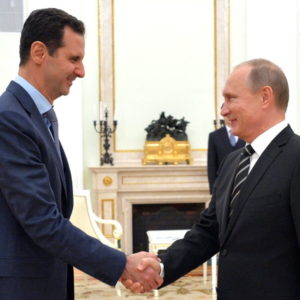Russia and Syria Sign Basing Pact as Peace Talks Continue
Russian President Vladimir Putin signed a fifty-year basing deal with his Syrian counterpart, Bashar al-Assad, on January 20. The deal marks a milestone in the two countries’ long-standing alliance and demonstrates Putin’s efforts to secure Russian regional influence. The agreement calls for an enlargement of Russia’s naval base in the Syrian city of Tartus to accommodate additional warships, including nuclear submarines. The two states also pledged to expand Russia’s air base in Latakia, which Putin has used for months to attack Syrian rebel groups as part of the counteroffensive that retook the city of Aleppo last December. The basing deal, which a Russian legislator announced will “protect the Syrian people from the terrorist threat and… consolidate [regional] stability,” will also send Russian personnel to Syria to repair Syrian Navy warships and guard ports. Over 75 percent of Syria’s weapons purchases come from Russia, which has tested its new weaponry in the Syrian conflict and forgiven considerable Syrian debt owed since the Cold War era.
U.S. policymakers have long recognized Syria’s strategic importance to Russia and its Soviet predecessor. In a 1957 intelligence estimate titled “Probable Soviet Action in Various Contingencies Affecting Syria,” the CIA noted that “the USSR would be reluctant to accept the loss to its prestige […] if a government it openly supports were overthrown.” This assessment remains true 60 years later. After signing a military-support pledge with Damascus in 1946, the Soviet Union provided its Cold War ally with weapons shipments - fighter aircraft, tanks, missiles, and advisors - and granted scholarships for Syrian students to experience Russian culture. In return, the Kremlin gained a valuable platform to project its influence in the Middle East, as well as access to Syrian energy resources and industry. From the 1970s onward, according to historian Christopher Andrew, Hafez al-Assad’s Baathist regime “emerged… as the Soviet Union’s only reliable ally among the major states of the Middle East.”
While Russia cements its ties with the Assad regime, talks continue between representatives of the Syrian government and rebel groups. The two met in a January 23-24 negotiation round in Astana, Kazakhstan, hosted by Russia, Turkey, and Iran. Following these recent discussions, regime and rebel delegates agreed to create a “trilateral mechanism to observe and ensure full compliance with the ceasefire.” While the old enemies exchanged bitter denunciations, the UN envoy to Syria, Staffan de Mistura, remains hopeful that upcoming talks in Geneva will lead to a lasting peace.
The United States sent its ambassador to Kazakhstan to serve merely as an observer, and the new ceasefire proposal has replaced the Russia-U.S. enforcement system negotiated in September. However, while U.S. President Donald Trump seeks to reduce international engagement and strengthen relations with the Kremlin, he has called for “safe zones” in Syria, setting him on a possible collision course with Damascus and Moscow. Only time will tell how the new U.S. administration responds to Russia’s growing clout in the Middle East.

